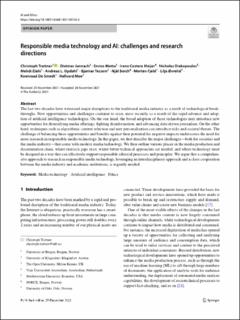| dc.contributor.author | Trattner, Christoph | |
| dc.contributor.author | Jannach, Dietmar | |
| dc.contributor.author | Motta, Enrico | |
| dc.contributor.author | Meijer, Irene Costera | |
| dc.contributor.author | Diakopoulos, Nicholas | |
| dc.contributor.author | Elahi, Mehdi | |
| dc.contributor.author | Opdahl, Andreas Lothe | |
| dc.contributor.author | Tessem, Bjørnar | |
| dc.contributor.author | Borch, Njål Trygve | |
| dc.contributor.author | Fjeld, Morten | |
| dc.contributor.author | Øvrelid, Lilja | |
| dc.contributor.author | De Smedt, Koenraad | |
| dc.contributor.author | Moe, Hallvard | |
| dc.date.accessioned | 2022-02-22T08:01:45Z | |
| dc.date.available | 2022-02-22T08:01:45Z | |
| dc.date.created | 2022-02-11T15:12:50Z | |
| dc.date.issued | 2021 | |
| dc.identifier.issn | 2730-5953 | |
| dc.identifier.uri | https://hdl.handle.net/11250/2980674 | |
| dc.description.abstract | The last two decades have witnessed major disruptions to the traditional media industry as a result of technological breakthroughs. New opportunities and challenges continue to arise, most recently as a result of the rapid advance and adoption of artificial intelligence technologies. On the one hand, the broad adoption of these technologies may introduce new opportunities for diversifying media offerings, fighting disinformation, and advancing data-driven journalism. On the other hand, techniques such as algorithmic content selection and user personalization can introduce risks and societal threats. The challenge of balancing these opportunities and benefits against their potential for negative impacts underscores the need for more research in responsible media technology. In this paper, we first describe the major challenges—both for societies and the media industry—that come with modern media technology. We then outline various places in the media production and dissemination chain, where research gaps exist, where better technical approaches are needed, and where technology must be designed in a way that can effectively support responsible editorial processes and principles. We argue that a comprehensive approach to research in responsible media technology, leveraging an interdisciplinary approach and a close cooperation between the media industry and academic institutions, is urgently needed. | en_US |
| dc.language.iso | eng | en_US |
| dc.publisher | Springer | en_US |
| dc.relation.uri | https://link.springer.com/article/10.1007/s43681-021-00126-4#article-info | |
| dc.rights | Navngivelse 4.0 Internasjonal | * |
| dc.rights.uri | http://creativecommons.org/licenses/by/4.0/deed.no | * |
| dc.title | Responsible media technology and AI: challenges and research directions | en_US |
| dc.type | Journal article | en_US |
| dc.type | Peer reviewed | en_US |
| dc.description.version | publishedVersion | en_US |
| dc.rights.holder | Copyright The Author(s) 2021 | en_US |
| cristin.ispublished | true | |
| cristin.fulltext | original | |
| cristin.qualitycode | 1 | |
| dc.identifier.doi | 10.1007/s43681-021-00126-4 | |
| dc.identifier.cristin | 2000622 | |
| dc.source.journal | AI and Ethics | en_US |
| dc.relation.project | Norges forskningsråd: 309339 | en_US |
| dc.identifier.citation | AI and Ethics, 2021. | en_US |

